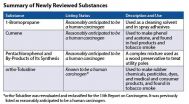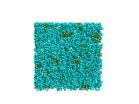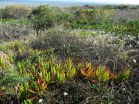High rates of anxiety and depression amongst patients with irritable bowel syndrome (IBS) have led many researchers to believe there could be a causal relationship between psychological factors and IBS symptoms. Now, scientists in Germany have found clear evidence that patients with IBS process pain signals from the gut abnormally, and that disturbed brain responses to pain are particularly pronounced in patients with more depression symptoms.1
At the 22nd United European Gastroenterology Week (UEG Week 2014) in Vienna, Austria, Professor Sigrid Elsenbruch from the University of Duisburg-Essen in Germany, will be presenting a new study which suggests that depression, but not anxiety, contributes to the abnormal pain processing observed in IBS in a model that addresses central pain inhibition during placebo analgesia. "Our study has shown that patients with IBS are less able to suppress pain signals in the brain coming from the bowel and that depression plays a role herein," she says. "This study confirms the complex relationship between the gut and the brain and shows that affective disorders may contribute to the development or maintenance of disturbed pain processing in IBS."
IBS, anxiety and depression IBS is the most common functional gastrointestinal disorder with prevalence rates of up to 23% reported.2 The condition is characterised by recurrent abdominal pain or discomfort, in combination with bloating and altered bowel habits (e.g. diarrhoea and/or constipation). Depression and anxiety frequently co-exist with IBS, with a recent study reporting that 38% of IBS patients had clinically-confirmed depression (compared with 6% of healthy controls) and 32% had anxiety (compared with 13% of healthy controls).3
"The fact that so many people with IBS have anxiety and depression has led many to speculate that IBS is primarily a psychological, not a physical, disorder," says Prof. Elsenbruch. "However, the condition is complex and most likely results from an interplay between psychological and biological factors. In fact, we don't really know whether anxiety and depression result from having IBS or whether they contribute to the development or maintenance of symptoms. In many patients, both possibilities may be true at the same time."
The "brain–gut" axis in IBS There has been significant scientific interest in the role of central nervous system mechanisms along the "brain–gut" axis in IBS. Neuroimaging studies have demonstrated that neural processing of visceral stimuli (i.e. stimuli generated from internal organs such as the intestine) is altered in
IBS, with many IBS patients showing lowered pain thresholds.4 In Prof. Elsenbruch's latest study, painful rectal distensions were performed using a pressure-controlled barostat system in 17 patients with IBS and 17 sex- and age-matched healthy controls.1 Neural activation in pain-related brain areas was assessed using functional MRI (fMRI) while subjects received sequential intravenous administrations of saline and what they thought was an anti-spasmolytic drug (but was actually a saline placebo), in order to observe activation patterns during a typical placebo pain response.
The fMRI results in the healthy volunteers demonstrated reduced neural activation in pain-related brain areas during both the saline and sham treatment (placebo), indicating significant central pain inhibition. However, there was no such inhibition in the group of IBS patients, suggesting a deficiency in central pain inhibitory mechanisms in IBS. Interestingly, higher depression (but not anxiety) scores on the Hospital Anxiety and Depression Scale (HADS) were associated with reduced central pain inhibition in this study.
"Our findings suggest that patients with IBS do not process visceral pain signals in the same way as healthy people and are unable to suppress pain signals in the brain and, as a result, experience more pain from the same stimuli," says Prof. Elsenbruch. "The fact that the presence of depression was associated with altered brain responses suggests that depression may contribute to these abnormal pain processes in IBS patients."
INFORMATION:
References
1. SchmidJ, et al. Gut 2014. May 15. pii: gutjnl-2013-306648. doi: 10.1136/gutjnl-2013-306648.
2. http://www.aboutibs.org/site/what-is-ibs/facts/statistics
3. Shah E, et al. Ann Gastroenterol 2014;27:224-30.
4. Elsenbruch S. Brain Behav Immun 2011;25:386–94.
Notes to Editors
About UEG Week
UEG Week is the largest and most prestigious gastroenterology meeting in Europe and has developed into a global congress. It attracts over 14,000 participants each year, from more than 120 countries, and numbers are steadily rising. UEG Week provides a forum for basic and clinical scientists from across the globe to present their latest research in digestive and liver diseases, and also features a two-day postgraduate course that brings together top lecturers in their fields for a weekend of interactive learning.
From October 18-22, 2014, UEG will connect everyone to its annual meeting via livestream on http://www.ueg.eu. State-of-the-art lectures of Europe's largest GI meeting may be followed online from around the world. Include #UEGWeek in your tweets. UEG Week 24/7 features all recorded sessions from UEG Week and provides convenient and direct access to the complete congress material, including E-posters and abstracts.
About UEG
UEG, or United European Gastroenterology, is a professional non-profit organisation combining all the leading European societies concerned with digestive diseases. Together, its member societies represent over 22,000 specialists, working across medicine, surgery, paediatrics, gastrointestinal oncology and endoscopy. This makes UEG the most comprehensive organisation of its kind in the world, and a unique platform for collaboration and the exchange of knowledge.
To advance standards of gastroenterological care and knowledge across Europe and the world, UEG offers numerous activities and initiatives besides UEG Week, including:
UEG Education, the universal source of knowledge in gastroenterology, providing online and classroom courses, a huge online library and delivering the latest GI news, fostering debate and discussion
Training Support, funding for innovative training and educational programmes, as well as international scientific and professional co-operations
UEG Journal, published bi-monthly, covering translational and clinical studies from all areas of gastroenterology
EU Affairs, promoting research, prevention, early diagnosis and treatment of digestive diseases, and helping develop an effective health policy for Europe
Find out more about UEG's work. Visit http://www.ueg.eu
Follow UEG on Twitter @my_ueg and @UEGMedia
Press contacts
Samantha Forster
Email: media@ueg.eu
Tel: +44 (0)1444 811099




